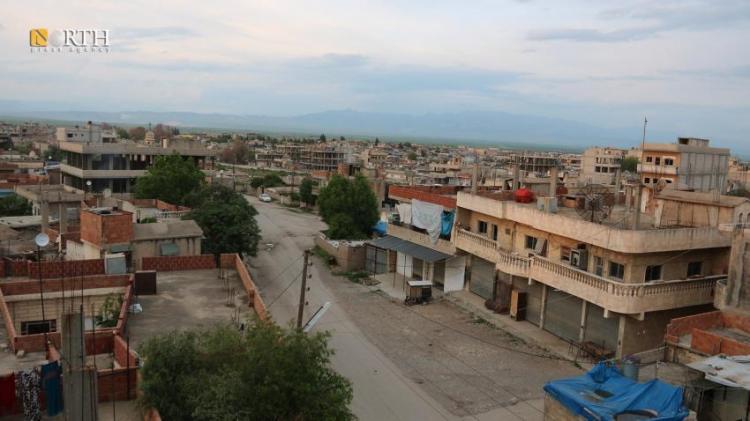Derik – North-Press Agency
Solnar Muhammad
Jannat Mustafa, a 55-year-old resident of Derik in northeastern Syria, could not accept the invitation of her only daughter living in the city to break the fast, as was previously the case, due to the ban imposed by the Autonomous Administration to confront coronavirus.
She told North-Press: "I talk to her on the phone, but I could not invite her break fast (Iftar) this year which was something I used to do every Ramadan, and this is sad for me and it makes me lose the sense of Ramadan, but we are forced to accept it because of the virus."
The ban imposed as a precautionary measure to prevent the outbreak of coronavirus in the Autonomous Administration areas caused the lack of some Ramadan atmosphere in the town of Derik, far northeast of Syria, where the customs of Ramadan which were being adhered to as the society's traditions disappeared.
Ramadan customs in the area consist of invitations to banquets and Iftar tables, and for family members or friends to go out together after breaking the fast to walk or to visit acquaintances, in addition to acts of worship such as going to the mosque to spend Tarawih prayers and reciting the Qur’an.
Last week, the World Health Organization called on Muslims to "be careful when reviving the virtue of generosity in the blessed month of Ramadan" during the coronavirus pandemic, while following official instructions issued regarding social and religious gatherings and physical separation in the context of outbreak of the virus.
Hussein Hawel, a 65-year-old resident of the countryside of Derik, said that he is still visiting neighbors and going to the city, but he "does not feel any Ramadan rituals as in previous years." He added that when he comes to the city to purchase his household needs, he does not see the dense market movement as was usually the case during Ramadan.
It is rare in Derik markets this year to see the cakes and maarouk (a sweet and fragrant brioche-like bread that is only made during Ramadan) that residents used to buy during the fasting month, as well as Shami berries, dates, licorice and tamarind dates which are available at a lower rate than usual, due to the high prices, fears of the outbreak of coronavirus, and the decision of lockdown.
Salih Muhammad, 59, a resident of the countryside of Derik, sees that there is a big difference between Ramadan this year and previous years, as the population had the potential to give Sadaqa (voluntary giving of alms or charity) , but this year the prices are very high, which may prevent many from paying alms and helping families who are unable to secure their needs.
"Food prices were previously cheaper, and people invited families and friends to banquets," he said.
Muhammad added that after performing Tarawih prayers they used to go out to public places and exchange visits, but because of the lockdown they perform Tarawih prayers in their homes, and there are no longer family gatherings.
On the 15th of March, the Office of Religions and Religious Affairs in the Autonomous Administration of North and East Syria decided to suspend Friday and group prayers, cancel all religious gatherings and social events, and suspend all religious and Quranic lessons as a precautionary measure to prevent the coronavirus outbreak.

